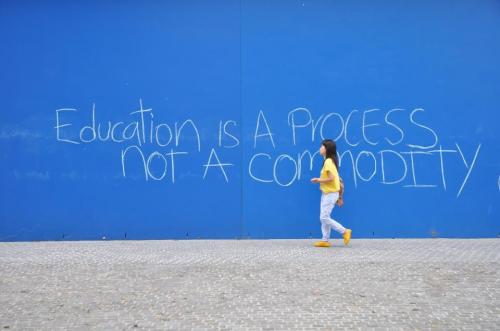As you have no doubt heard, the State School Reform Office of Michigan has released the names of the 38 schools that are slated for possible closure. These are schools that have been determined to be among the “lowest performing” schools in the state as measured by “achievement data” for the past 3 years. These are schools that Betsy DeVos, soon to be cleared as Secretary of Education, calls “failing.”
I call B.S.
And, more importantly, I call institutional racism.
Let’s be clear and name this- Betsy DeVos is a huge proponent of institutional racism.
How do you spot institutional racism? It’s pretty easy.
First, here is what you don’t do. You don’t go looking for individual racists. I honestly don’t know DeVos’s personal ideas on race. I am certainly not naming her as a racist. Her intentions are beyond by my ability to determine. More so I don’t see her personal intentions as particularly relevant. (The same goes for Attorney General nominee Jeff Sessions. Who cares if those who know him claim he’s a nice guy? See below.)
What is relevant are the effects and outcomes of the policies that she supports. These are very, very easy to determine. And they clearly support institutionalized racism.
It goes without question that DeVos has supported the narrative of “failing schools” and that she has funded it. In the state of Michigan this has led to a number of weird policies (the ability of the SRO to close schools being only one) that have become institutionalized through the financial backing and political influence of DeVos. (As an excellent example of how DeVos exerts pressure, see here.)
So let’s dig a little deeper.
What do these 38 schools on the SRO closing list have in common? They are in areas of high concentrations of poverty, and high populations of African American students. This is called a “disproportional outcome,” one that has a disproportionate effect on a particular group of people. In this case, we are talking about poor Black communities. Poor Black communities are having their schools taken from them. Poor Black communities are having their schools being named as failures, which allows us to avoid considering the racialized economic conditions that actually led to these communities having high concentrations of Black students who also tend to be struggling with poverty. Schools are being named as failures while hiding the fact that those in power have failed those communities.
It is shameful.
And it is, by definition, institutionalized racism.
Maybe we should ask, does closing schools work?
The answer is yes if your goal is to continue to steal resources from those most in need of them.
The answer is no if you are hoping to support these communities.
Hell no.
Not even close.
As an example, Muskegon Heights public school district was completely charterized as a result of the having been overtaken by emergency management in 2012. The whole district was given to a private company to run as a charter district. In 2014, that company left in the middle of the school year because the profit wasn’t what projections hoped for. It remains charterized.
And it is now is on the closure list.
Oh well.
Muskegon Heights district is 95.6% Black with a poverty rate of 61.7%. Hmm…
Let’s check the race and poverty demographics of Benton Harbor, with 3 schools on the list: Poverty = 54.9% and it has a population that is 89.2% Black.
Detroit, with 24 schools on the school closure list? The poverty rate is 39%, and its racial make up is 81.6% Black. (Mind you, for comparison, the state of Michigan’s poverty rate is about 17%.)
Need I continue? I invite you to check out the race and poverty demographics of Pontiac, whose only high school left is on the list. Same goes for Saginaw. It’s easy to find. Google works. Tell me if I’m wrong.
So what are measuring when measure for “failing schools”? We are measuring, very accurately, the conditions of poverty and the racialized concentrations of Black communities.
In acting on these measures via harmful policies, we are replicating and reifying institutional racism.
Thank you Betsy.

 Let me be clear. Detroit schools are under the gun.It’s not their fault- they are trying to survive.
Let me be clear. Detroit schools are under the gun.It’s not their fault- they are trying to survive.